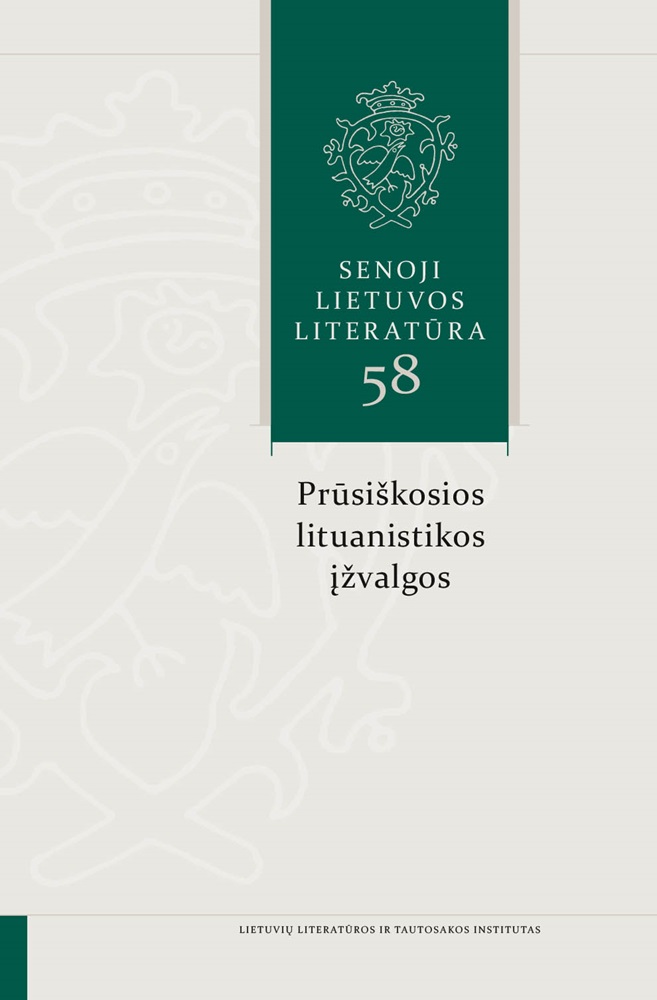Publications of Fiction Texts in Prussian Lithuanian Periodicals in the Nineteenth and Early Twentieth Centuries: Statistics and Insights
Abstract
In 1823, the first Lithuanian periodical appeared in Tilžė (Ger. Tilsit). It was a magazine-type publication called Nusidavimai Dievo karalystėje. It was followed by more Lithuanian newspapers and their supplements in Prussian Lithuania. Print shops produced the newspapers in German and Lithuanian, in Gothic typeface. Most of them appeared in the print shops of Tilžė and Klaipėda (Ger. Memel). The newspapers published a wide range of material: articles on various subjects (philosophy, religion, the natural sciences, art, geography, etc.), reviews, and also texts of fiction, in the dissemination of which the periodicals of Prussian Lithuania played an important role. The article examines the amount of fiction texts (original and anonymous prose and poetry) published in Prussian Lithuanian periodicals, identifies the periodicals that published the most of them and their changes over the decades. It also reveals the cultural context of the printing of fiction in the periodical press: the network of people involved in the creation, publication, and distribution of texts. The names of fiction authors and periodical editors are identified, and their relationship to the world of culture is discussed.
It was established that during the period under study (1849–1913), more than 3250 publications of works of fiction appeared in 27 periodicals and their supplements intended for Prussian Lithuania (Kaimynas, Lietuviška ceitunga, Tilžės keleivis, and others). The texts of fiction published in these periodicals came in a variety of genres: poetry, prose, drama, satire, and humour. The choice of the authors and types of texts depended on the editors of the publications. The editors of the periodicals that published the largest numbers of the texts of fiction were individuals active in the field of Prussian Lithuanian writing in the late nineteenth-early twentieth centuries.
The fiction published in the periodical press also spread in the form of albums of copies. The manuscript collections of fiction by Prussian Lithuanian literary figures kept at the Manuscripts Department of the Wroblewski Library of the Lithuanian Academy of Sciences point to the popularity of fiction in the nineteenth century.

This work is licensed under a Creative Commons Attribution 4.0 International License.
Most read articles by the same author(s)
- Ona Aleknavičienė, Liucija Citavičiūtė, Mintautas Čiurinskas, Kęstutis Gudmantas, Raimonda Meyer-Ravaitytė, Simona Mocejūnaitė- Vaitkienė, Jūratė Pajėdienė, Kotryna Rekašiūtė, Žavinta Sidabraitė, Tadas Šaulys, Eleonora Terleckienė, Viktorija Vaitkevičiūtė Verbickienė, Chronicle , Senoji Lietuvos literatūra: Vol. 58 (2024): Senoji Lietuvos literatūra
- Mintautas Čiurinskas, Živilė Nedzinskaitė, Kotryna Rekašiūtė, Asta Vaškelienė, Chronicle , Senoji Lietuvos literatūra: Vol. 48 (2019): Senoji Lietuvos literatūra
- Eleonora Buožytė, Mintautas Čiurinskas, Živilė Nedzinskaitė, Kotryna Rekašiūtė, Viktorija Vaitkevičiūtė, Asta Vaškelienė, Chronicle , Senoji Lietuvos literatūra: Vol. 47 (2019): Senoji Lietuvos literatūra
- Mintautas Čiurinskas, Simona Jaskelevičiūtė, Dovilė Keršienė, Ligita Mikulėnienė , Živilė Nedzinskaitė, Ona Petrėnienė, Kotryna Rekašiūtė, Chronicle , Senoji Lietuvos literatūra: Vol. 44 (2017): Senoji Lietuvos literatūra
- Mintautas Čiurinskas, Kotryna Rekašiūtė, Asta Vaškelienė, Viktorija Vaitkevičiūtė, Chronicle , Senoji Lietuvos literatūra: Vol. 52 (2021): Senoji Lietuvos literatūra
- Žavinta Sidabraitė, Kotryna Rekašiūtė, Miks Stolperjons, a Satirical Poem from the Second Half of the Nineteenth Century , Senoji Lietuvos literatūra: Vol. 58 (2024): Senoji Lietuvos literatūra
- Žavinta Sidabraitė, Kotryna Rekašiūtė, Miks Stolperjons, a Satire in Verse (the Second Half of the Nineteenth Century): The Manuscript and Two Publications in the Lithuanian Press , Senoji Lietuvos literatūra: Vol. 58 (2024): Senoji Lietuvos literatūra
- Silva Pocytė, Kotryna Rekašiūtė, Reflections of Evangelical Missions and Missionary Activities in Nineteenth-Century Lithuanian Periodicals of Prussian Lithuania , Senoji Lietuvos literatūra: Vol. 53 (2022): Senoji Lietuvos literatūra
- Žavinta Sidabraitė, Kotryna Rekašiūtė, Some trends in the formation of Surinkimininkai literature in Prussian Lithuania: links with the Western tradition and local innovations , Senoji Lietuvos literatūra: Vol. 46 (2018): Senoji Lietuvos literatūra




